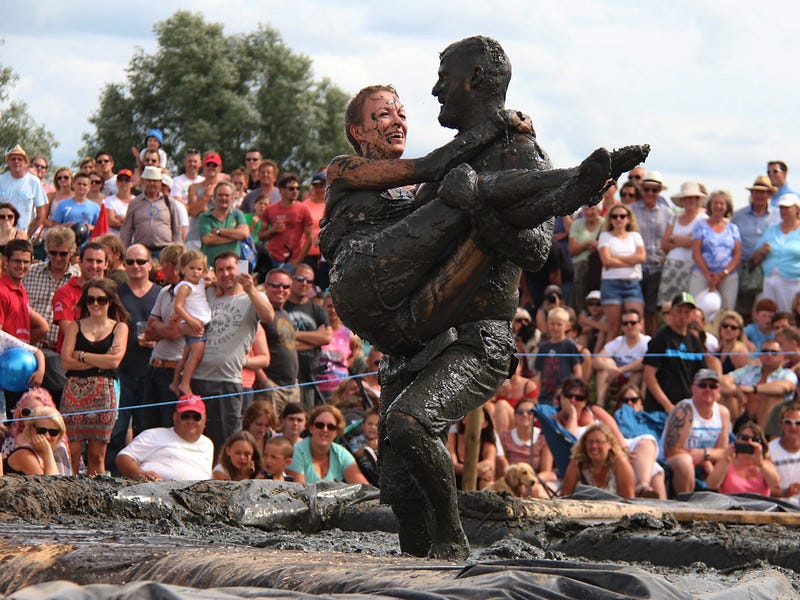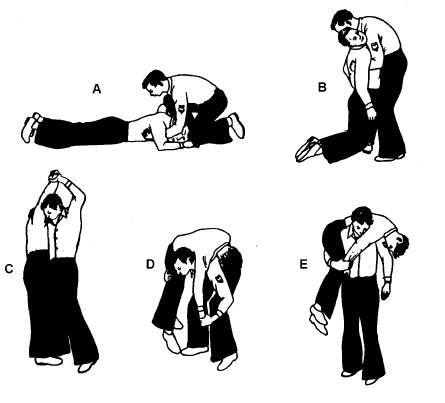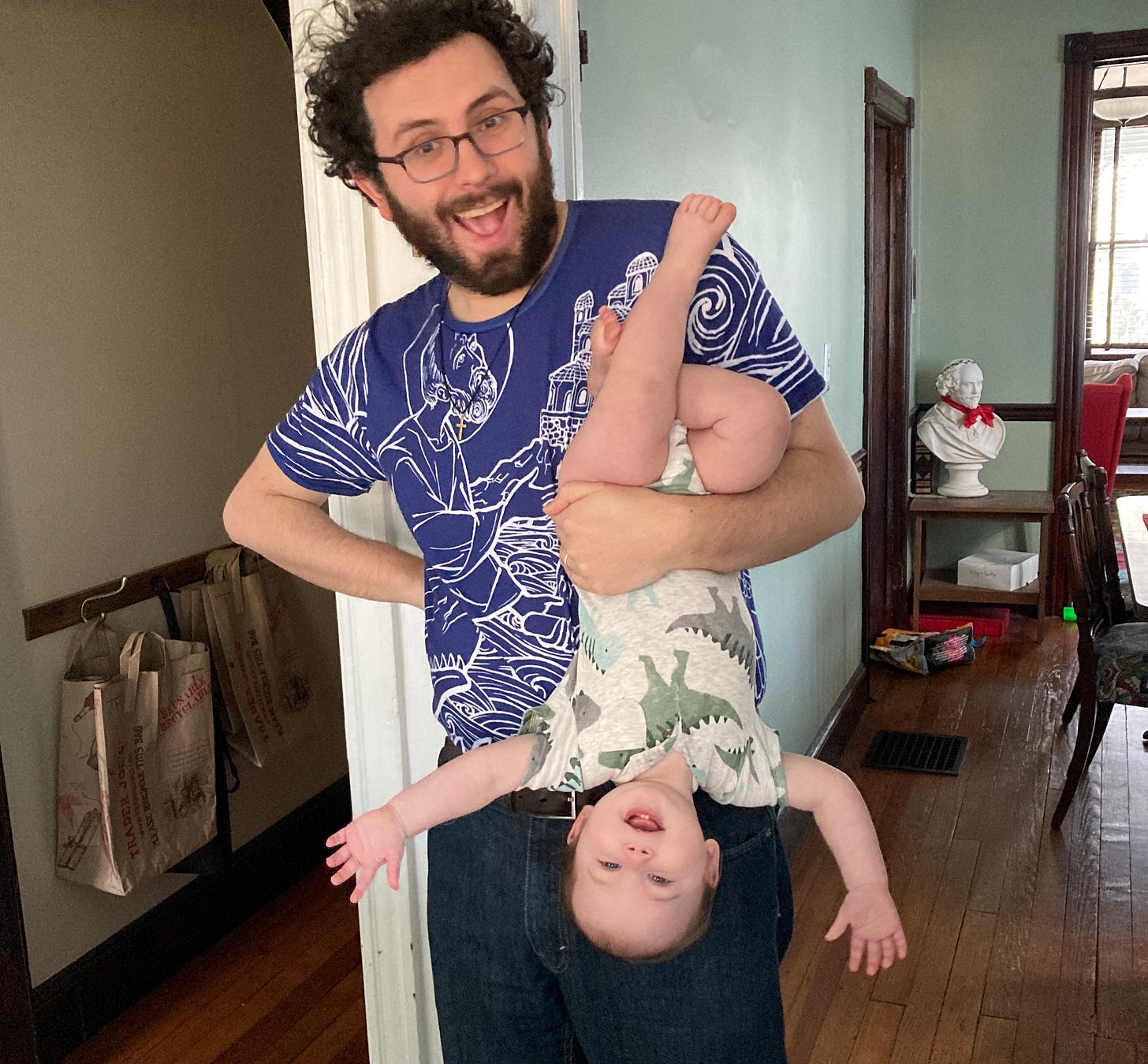Men Carry the Weight (of this conversation)
An all-men talkback on lending strength to others
Other Feminisms is back from summer holidays! Thank you to everyone who participated in the Wizard of Earthsea book club. I have new essays on the way, and a conversation on deck with the Washington Post’s Alyssa Rosenberg on where pro-choicers and pro-lifers can collaborate. This week, I want to return to some of your thoughts on where men get to carry others.
In the spring, I wrote a piece for Deseret arguing that teen boys should do more elder care. I wrote:
For teen boys, adolescence is a time of growing into strength without necessarily knowing what to do with it. Team sports are a way to blow off energy and grow into brotherhood; shop class can be a way to learn to make a mark on the world. But it’s hard for young men to get experience with the other purpose of their strength — to be a support to someone weaker than themselves. […]
Too many teen boys and young men get stuck in a holding pattern — too young for marriage and unsure what to do with their liveliness in the meantime. They don’t need more allowances made for them; they need more to be asked of them. Boys will be boys until someone depends on them to be men.
I asked the readers of Other Feminisms to consider two questions in response:
For the male readers of Other Feminisms, please come out of the woodwork as commenters and let us know—where have you had your best opportunities to use your strength for others? Where did you want to be relied on but feel out of place?
For the moms of boys, where do you see your sons having opportunities to have someone rely on their growing strength, particularly in adolescence?
For today, I’m going to focus on that first question, and turn the floor over to the men who are part of Other Feminisms. I really appreciated hearing your stories, and I’m glad you’re part of this community.
Joseph told the story of living with his grandmother during grad school and covid:
Even after I moved out, we still went for dinner weekly until I moved to a new job last year. At the same time, I also came face-to-face with the difficulty of my own laziness and tendencies towards selfishness—was it worth sleeping in or going to a restaurant with friends if it meant that she might mow the lawn herself or get sick because I brought covid home? (The latter never happened, thankfully, but the former did.) My grandmother is an independent, stubborn, capable woman, and it was not an uncommon experience to come visit and find that she had moved a couch down to her basement all by herself, or to drive over (after I moved out) to shovel the driveway and find her out there, driveway shoveled, smirking and acting as though nothing was out of the ordinary. This slowly impressed on me the need to be less self-centered and more proactive in meeting the needs of others.
This is still a work in progress, but as I've become engaged to a young woman who is similarly stubborn, extremely competent, and unwilling to ask for help for fear of being a burden, I've had to learn to anticipate her needs and offer my strength before it's requested—not so that I can do everything for her and fix all her problems (I can't, and she wouldn't want me to), but so that she knows that my strength, skill, and time are there for her.
I recognize something of myself in Joseph’s grandmother. When someone asks me “Would you like me to do [X] for you?” I have trouble saying “Yes” if it’s possible for me to do myself, even when I’d be grateful for the help.
It’s something I work on—I want to accept help gratefully, rather than treat offers as conditional on me being in extremis, but I can certainly see how it helps to step into the gap without waiting for permission.
Kai grew up in an “and my axe!” community:
I grew up in a small, country church with many flaws. One of the bright spots was the regular call to action for the young men to assist in clean up after wind storms in our area. Fathers and older teenagers would grab their chain-saws. Younger boys gathered sticks and branches. Once the work was complete, we would all gather somewhere for a meal or at least a snack. Much of the work was done for seniors in our community; it would have cost them a fortune otherwise. Though I have left much of that world behind, I still make it a practice to contact my priest and offer my chainsaw after a storm.
(I’m reminded of the heroism of the Cajun Navy in the wake of Katrina. It’s great to have a norm that people go out to help after a storm that doesn’t rise to the level of federal disaster.)

Michael realized how long he’s been waiting to be asked:
I’ve been sitting on the “best opportunities to use your strength” question all day and am realizing that until the past couple years, I was never relied on for my strength. It’s only in becoming a dad that physical strength has become a piece of my identity, and of what I have to offer. Partially because my wife lost much of her strength in pregnancy and birth, and partially because kids need an adult’s physical strength 937582 times a day.
But huh! How much I would have appreciated an outlet for my physical strength, even when I wasn’t as strong as my peers. I definitely had some serious insecurities growing up about my perceived lack of strength, which have only recently subsided
I think it’s hard to know if you’re ready to be a dad or a husband if you don’t get to practice having people depend on you until then!
(I think its the same kind of hard as trying to help your parents die well, but not being present at any deathbeds until they’re dying).
James reflected on his experience lending strength and growing in mastery:
A major feature of my teenage years in a Mormon ward in Columbus, Ohio was helping with moves. It was really great to feel useful. A move involves strength, but you realize quickly from watching adult men that some wisdom and experience goes a long way toward making the most of what your body can do. I was also seeing a lot of different economic and social experiences. That was really useful.
I also remember doing some group service projects where we'd do yard work or cleaning for seniors. Those tended to have less direct interaction with the people we were helping than a move, where they're constantly giving direction.
We would also regularly go on Sunday visits to homebound seniors to take them sacrament/communion or to pick up fast offerings. Those visits tended to involve more talking and social connection than physical engagement, but were still really useful for me in learning to use my attention as a gift, a thing which could be consecrated.
I don't remember giving any medical or similar care service until I was an adult. I don't know why. Maybe it's because we culturally associate those tasks with greater discretion: helping move someone or wash them often involves a greater vulnerability for the receiver.
I really like James’s point about beginning by offering raw strength, but growing by seeing how older men use their strength well. You might have more raw power, but less wisdom and finesse.
And I think he’s right about the reason that it’s more natural to mow a senior’s lawn than to help them get to and from the bathroom. It’s ok to mess up a lawn or do it lackadaisically as you learn focus in a way it isn’t safe to give half your attention to someone medically and physically fragile. It’s not a job a beginner can take on alone.
But it seems to me like a reasonable mark of maturity that you could be trusted with that responsibility.
And finally, a story from my husband:
A moment from my youth (I was a rising college sophomore, I think) that springs to mind occurred when I was a counselor at Shakespeare summer camp. We were having a midnight rehearsal in the immediate run-up to our performance of Julius Caesar. One of the girl campers, unfortunately, had a medical condition flare up and sort-of collapsed backstage. She was conscious but too weak to walk. We needed to get her from the theater to the camp nurse's office, and it seemed the quickest way to do this was to drape her over my back and have me carry her like a beast of burden. I recall thinking at the time, even though the situation was scary, that this was what it felt like to be a man. There was a real satisfaction in how clear it was that my strength and size was needed, even essential, in that moment. Everything all worked out okay. As I've recalled the incident since then it feels to me less like a crisis and more like a milestone.
I’ve had no emergencies that dramatic so far, but I’ve relied on his strength in less flashy, still-and-stable ways. Once you come home from the hospital post-c-section, you lose the support of a hospital bed. Alexi held out his arms, strong and steady, so I could use my arms to lift myself out of bed while my abs were impossible to rely on.
Some of his recent lifting is a little lighter.




Appreciation is my usual reaction these posts but this one is particularly fine. I grew up observing men lend their strength: my brothers, my uncles, friends' dads. Recently I had the gift of seeing my son carry heavy things to the honor of a lost friend. The pairing of teen boys and elder care is inspired, as new-felt strength serves visible goods.
Love that last photo of your husband!
3 of my teenage/young adult sons recently had the opportunity to help my mom and dad (ages 85 & 86), who were getting new carpet & paint in their bedroom & needed their furniture moved out & then back in. On the surface, that seems like an easy, of-not-much-significance task, and maybe even a little annoying. But reading your post made me reflect on how important that really was. My strong young men were able to do something in minutes that would have taken my parents days (and maybe resulted in harm or injury). And my boys saw they were needed, saw their role at this point in the generations. My dad now relies on my youngest (age 17) to fix things for him (case in point: rototiller), & I know my son feels the power of his grandfather's belief in him. Thanks for encouraging us to look beneath the surface!